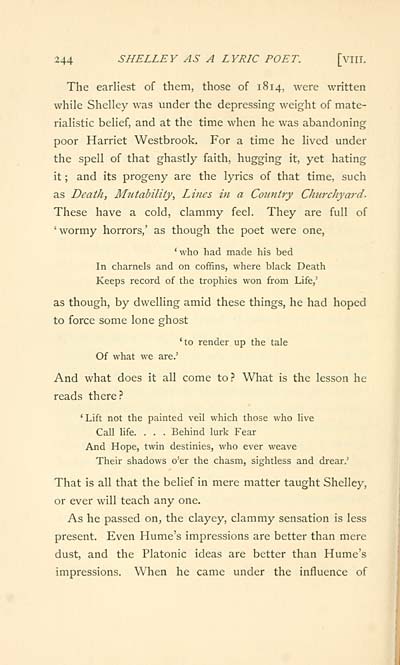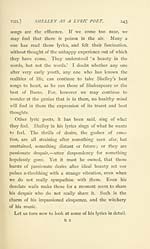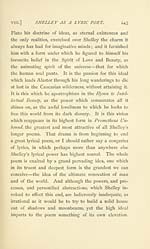Ossian Collection > Aspects of poetry
(260)
Download files
Complete book:
Individual page:
Thumbnail gallery: Grid view | List view

244 SHELLEY AS A LYRIC POET. [vill.
The earliest of them, those of 1814, were written
while Shelley was under the depressing weight of mate-
rialistic belief, and at the time when he was abandoning
poor Harriet Westbrook. For a time he lived under
the spell of that ghastly faith, hugging it, yet hating
it ; and its progeny are the lyrics of that time, such
as Death, Mutability, Lines in a Country CJmrchyard.
These have a cold, clammy feel. They are full of
'wormy horrors,' as though the poet were one,
'who had made his bed
In charnels and on coffins, where black Death
Keeps record of the trophies won from Life,'
as though, by dwelling amid these things, he had hoped
to force some lone ghost
'to render up the tale
Of what we are.'
And what does it all come to? What is the lesson he
reads there?
'Lift not the painted veil which those who live
Call life. . . . Behind lurk Fear
And Hope, twin destinies, who ever weave
Their shadows o'er the chasm, sightless and drear.'
That is all that the belief in mere matter taught Shelley,
or ever will teach any one.
As he passed on, the clayey, clammy sensation is less
present. Even Hume's impressions are better than mere
dust, and the Platonic ideas are better than Hume's
impressions. When he came under the influence of
The earliest of them, those of 1814, were written
while Shelley was under the depressing weight of mate-
rialistic belief, and at the time when he was abandoning
poor Harriet Westbrook. For a time he lived under
the spell of that ghastly faith, hugging it, yet hating
it ; and its progeny are the lyrics of that time, such
as Death, Mutability, Lines in a Country CJmrchyard.
These have a cold, clammy feel. They are full of
'wormy horrors,' as though the poet were one,
'who had made his bed
In charnels and on coffins, where black Death
Keeps record of the trophies won from Life,'
as though, by dwelling amid these things, he had hoped
to force some lone ghost
'to render up the tale
Of what we are.'
And what does it all come to? What is the lesson he
reads there?
'Lift not the painted veil which those who live
Call life. . . . Behind lurk Fear
And Hope, twin destinies, who ever weave
Their shadows o'er the chasm, sightless and drear.'
That is all that the belief in mere matter taught Shelley,
or ever will teach any one.
As he passed on, the clayey, clammy sensation is less
present. Even Hume's impressions are better than mere
dust, and the Platonic ideas are better than Hume's
impressions. When he came under the influence of
Set display mode to: Large image | Transcription
Images and transcriptions on this page, including medium image downloads, may be used under the Creative Commons Attribution 4.0 International Licence unless otherwise stated. ![]()
| Early Gaelic Book Collections > Ossian Collection > Aspects of poetry > (260) |
|---|
| Permanent URL | https://digital.nls.uk/78388392 |
|---|
| Description | Selected books from the Ossian Collection of 327 volumes, originally assembled by J. Norman Methven of Perth. Different editions and translations of James MacPherson's epic poem 'Ossian', some with a map of the 'Kingdom of Connor'. Also secondary material relating to Ossianic poetry and the Ossian controversy. |
|---|
| Description | Selected items from five 'Special and Named Printed Collections'. Includes books in Gaelic and other Celtic languages, works about the Gaels, their languages, literature, culture and history. |
|---|

